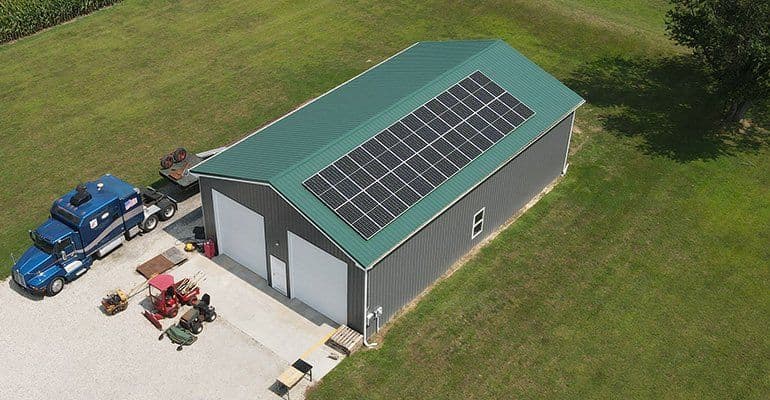Do Solar Panels Work on Cloudy Days?
As we all know, solar panels need direct sunlight to generate electricity and we love solar to take full advantage of the natural resource. But as a solar homeowner, it can be frustrating when the weather gets cloudy instead of sunny. Therefore, will solar panels generate enough during cloudy weather? The short answer is YES!
How will cloudy days affect solar energy generation?
Quick question: Have you ever been sunburned on a cloudy day? If so, you might’ve been surprised by how it happened, right? Simply explained, the clouds didn’t completely block off the sun’s UV rays.
Therefore, it’s the same for solar panels. While cloudy days might look inefficient for solar panels, the solar radiation will still penetrate the clouds which will allow electricity production.
The only difference would be the amount produced by your solar panels. Of course, they will not produce as much as they do during sunny days but will generate between 10-25%, which is decent.
How is electricity through solar panels generated?
When your solar panels are exposed to the sun’s rays, the sunlight will be converted to direct current (DC) which would then be turned into an alternative current (AC) by the inverter.
When you produce more electricity than you can consume, the power goes back to the grid to be used by the utility for net metering.
Varying from state to state, Net Metering generally gives you credit for the excess amount generated and allows you to draw that credit when your system isn’t producing enough electricity.
3 Quick facts about solar panels and cloudy weather:
- Solar panels work as well in cold and cloudy weather. For example, New York, which is also known to experience inclement weather, tops the list of U.S cities that benefit from solar installations.
- Contrary to what many think, hot weather isn’t necessarily better to offset your electricity cost. In fact, warmer temperatures can affect the amount of energy output of your solar panels. Generally tested at about 77 degrees, if the temperature rises to 78 and above, the current will increase but the voltage will decline. Since voltage decreases faster than the current can increase, the efficiency of your solar panels will be compromised.
- Germany was named a leader in renewable energy, also famous for its lack of sunlight. Germany accounts for about 25 percent of the world’s solar power output and achieved its strongest growth in half a decade in 2018, according to Greentech Media.
In conclusion, your solar panels will work as well during cloudy days. They will not generate as much as they do during sunny days, but will still produce between 10-25%, which is decent.
Contact Us Today
and Schedule Your
Free Estimate
Special Offer
Get a Referral Fee
For Any Customer You Refer Directly to Us
Many homeowners who plan on installing solar panels on their property wondered about the different functionalities...
You’ve wanted to have solar panels installed for quite some time...
As solar energy adoption grows, many homeowners are discovering the benefits of using PV solar panels to power their homes...
Affordable Options
We Offer In-House Financing
Receive Payment Terms That Suit Your Needs

See How We Can Enhance Your Home With a New Roof or Solar Panel System
Read Our Reviews
Pinnacle did a fantastic job! The sales professional was courteous and not pushy. The install team did a great job of advising me on what they were going to do before doing it and advising me once complete. They did an great job with daily and end of project cleanup.
One of the best parts about working with Pinnacle is they keep you updated through out the entire process. They show up when they say they will. They are pleasant to work with. The solar panels look amazing, and we are happy with the work performed.
Pinnacle exteriors from start to finish was professional and attentive. They kept me informed along the way so I knew what was expected. The end product showed exceptional craftsmanship and attention to detail. Very happy with the end product.
My experience with Pinnacle Exteriors has been outstanding from beginning to the end. The support was superb!! I highly recommend Pinnacle Exteriors for their expertise, support and professionalism!
We chose Pinnacle Exteriors to install our solar system and couldn’t be happier. From sales to installation to support you won’t find a better team to guide you through the process and make sure your install is correct.
We are so happy we chose Pinnacle Exteriors and strongly recommend all our friends, neighbors and family members to contract with them for every exterior job, but especially for solar installation! We've seen a drastic reduction in our energy bills and after just 4 months of utilizing solar energy, we are seeing a return on our investment.
I am extremely satisfied with Pinnacle Exterior’s from start to finish. The installer’s are very well experienced courteous and do a excellent job. I highly recommend them.





Trusted Excellence



Our Location

Mon - Fri : 9:00 AM - 5:00 PM
Saturday : 10:00 AM - 2:00 PM
Sunday : Closed

